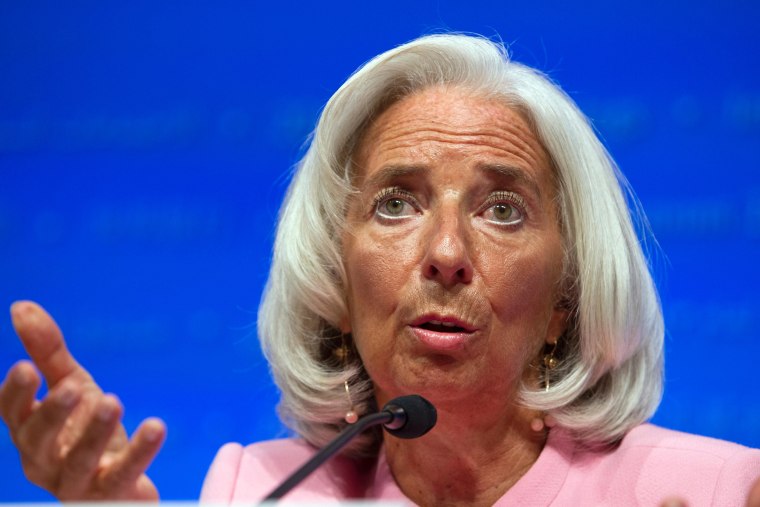1) Even before the International Monetary Fund named Christine Lagarde as its managing director in 2011, she was considered one of the world’s most powerful women. From the Daily Mail:
Before joining the IMF she has been ranked as the 17th most powerful woman in the world and has received high praise from all corners of it.
Timothy Geithner, U.S. Secretary of the Treasury, once said: ‘Her lightning-quick wit, genuine warmth and ability to bridge divides while remaining fiercely loyal to French interests have been a source of admiration.’
2. Lagarde is an accomplished synchronized swimmer. From The Guardian:
In May 1968, when Christine Lagarde was a teenager, French schools were shut down during a student uprising. As her fellow pupils took to the streets to throw cobblestones at the police, Lagarde took up synchronised swimming and went on to win a bronze medal in the national championships. "It was synchronised swimming that taught me: 'Grit your teeth and smile'," she has said. And it's been helpful in her subsequent career in politics: "In exactly the same way, it's a sport of resistance and endurance. You're in tension and control."
3. When Lagarde was called to serve in the French government back in 2005, she left so quickly that she forgot something important. From her commencement address to Harvard’s Kennedy School in May 2012:
And then my life took another unexpected turn. In 2005, I received a call from Paris; the Prime Minister was asking me to join the French government. When you are called to public service, there is really only one answer you can give. So I gave up my cozy chairman’s life in Chicago, packed my bag and flew immediately to Paris. In my haste and excitement, I left my reading glasses behind. So for her first few days of office, the newest French minister tended to squint a lot!
4. Lagarde was a valuable intern to a freshman Republican congressman during a significant part of American history. From The Washington Post:
In May 1974, Rep. William S. Cohen, a Republican freshman on the House Judiciary Committee, was gathering evidence that led to his eventual vote to impeach President Richard M. Nixon. But outside the Watergate hearings room, Cohen needed a French speaker to respond to all the partisan mail from his French Canadian constituents in Maine.
He was in luck. A French exchange student — a senior at the private Holton-Arms School in Bethesda — had just begun interning in his office that month.
The internship formed an important part of the teenager’s year in America and would ultimately furnish an only-in-Washington coincidence: The congressman-and-future U.S. defense secretary was passing off scut work to the future head of the International Monetary Fund, Christine Lagarde.
5. Lagarde is an advocate for bringing more women into business and positions of leadership. She spoke about the issue during a Clinton Global Initiative panel in September. From The Wall Street Journal:
On the panel, Ms. Lagarde, 57, pointed out that women make 70% to 80% of the consumption decisions in most countries. She also noted the key role of women in bringing Iceland out of its recession. When its economy crashed, "the banks, the funds, the government -- everything was taken over by women," she said. "So when it's messy, you get the women in. But when the mess is sorted, keep the women," she added, chuckling.
Back at the Carlyle Hotel, where she was staying along with a host of dignitaries for the United Nations General Assembly, she talked about the obstacles to getting more women to work: education, access and, in some countries, safety. The question is how to fix it: Some see it as a problem of individual initiative, others see at it as a collective, systemic issue. Ms. Lagarde, the first female chief of the IMF, hopes to reconcile the two views. "It's both a collective responsibility, where society has to come together, . . . [and] an individual responsibility," she said. "I've done things and decided my destiny was not just dependent on other people."
6. In a 2011 Vogue profile, Lagarde described the interview process she went through to earn the top job at the IMF:
Speaking of the fraught process of convincing the United States and, especially, developing nations that the IMF won’t be a European or American fiefdom, Lagarde described a process that sounds more like speed-dating than high finance: “Imagine a room with 24 men and you’re the only woman. The first day, I had to meet with each of them separately, 20 minutes each and then five minutes in-between time.
"That was a long day"—after a week that had taken her to China, Brazil, and India. “Then the next day, all 24, the whole boys’ club, for a grilling. At the age of 55, I never thought I’d have to go through that again, studying, preparing—I felt as if I were 20 years old, interviewing for my first job.”
7. Lagarde recently welcomed President Barack Obama’s nomination of Janet Yellen as Federal Reserve chair with this tweet:
